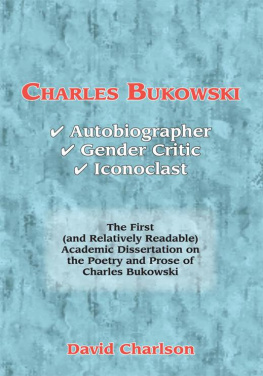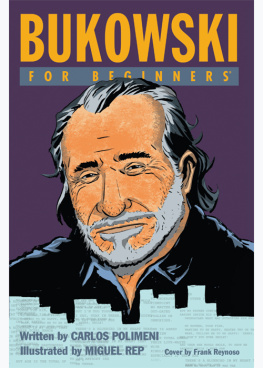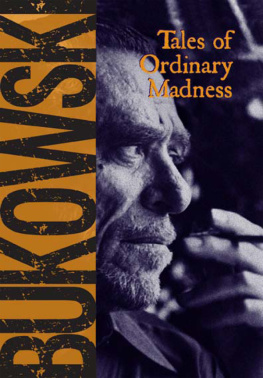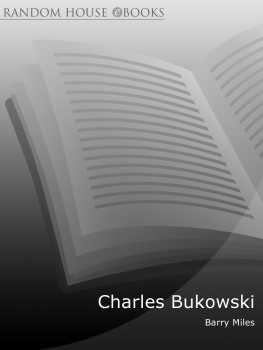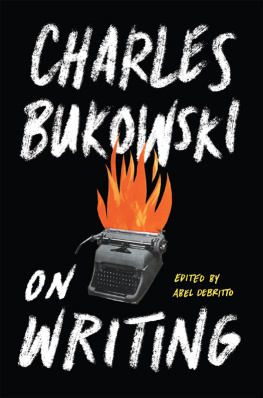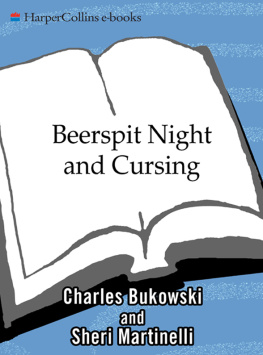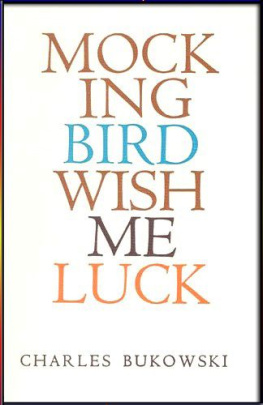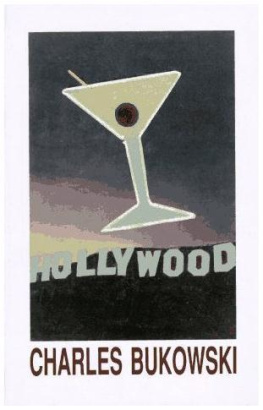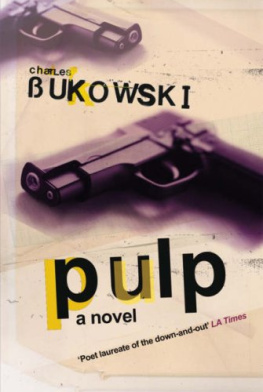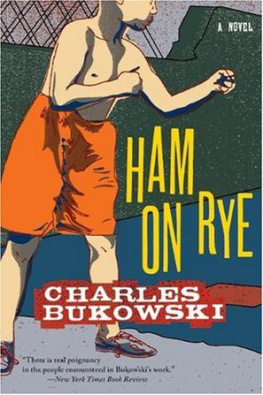Charles Bukowski:
Autobiographer, Gender
Critic, Iconoclast
by David Charlson
Copyright 2005 David Charlson.
All rights reserved. No part of this publication may be reproduced, stored in a retrieval system, or transmitted, in any form or by any means, electronic, mechanical, photocopying, recording, or otherwise, without the written prior permission of the author.
Note for Librarians: A cataloguing record for this book is available from Library and Archives Canada at www.collectionscanada.ca/amicus/index-e.html ISBN 1-4120-5966-6
TRAFFORD
PUBLISHING
Offices in Canada, USA, Ireland and UK
This book was published on-demand in cooperation with Trafford Publishing. On-demand publishing is a unique process and service of making a book available for retail sale to the public taking advantage of on-demand manufacturing and Internet marketing. On-demand publishing includes promotions, retail sales, manufacturing, order fulfilment, accounting and collecting royalties on behalf of the author.
Book sales for North America and international:
Trafford Publishing, 6E2333 Government St.,
Victoria, BC 8 4P4 CANADA
phone 250 383 6864 (toll-free 1 888 232 4444)
fax 250 383 6804; email to
Book sales in Europe:
Trafford Publishing (uk) Ltd., Enterprise House, Wistaston Road Business Centre,
Wistaston Road, Crewe, Cheshire cwi 7rp UNITED KINGDOM
phone 01270 251 396 (local rate 0845 230 9601)
facsimile 01270 254 983;
Order online at:
trafford.com/05-0867
10 9 8 7 6 5 4 3 2
Contents
This is the first doctoral dissertation published in America that considered the entire oeuvre of Charles Bukowski up through the time of its publication in 1995, and I offer it as a historical document concerned with an amazing author who continues to matter to the world.
Ignoring advice back then to not write on a living author, I began the project before Bukowskis unfortunate death in 1994. Ten years later, I hope that it provides a good introduction to Bukowski along with some worthy insights, yet I know that our author himself would prefer that you just read him. Thats not a bad idea at all.
With the exception of a few corrected typos and a few clarifications, it is published here as it was at the University of Kansas. Bukowski scholarship finally has begun to take hold to some degree, and I offer my contribution in that light.
David Charlson, Oklahoma City, 2005
David Jon Charlson, July 1995
University of Kansas
Charles Bukowski:
Autobiographer, Gender Critic, Iconoclast
Often dismissed as the Dirty Old Man he once called himself, Charles Bukowski is an American author whose surface vulgarity masks a deeper purpose, for his prose and poetry challenge the social and cultural status quo of America. Through dramatizing much of his life in his work, he targets the deadening oppressiveness of the workplace, the questionable aspects of traditional masculinity, and elitist attitudes in art and academia. Because of his first-hand experience in a lower-class underworld, his work sometimes resembles the Dirty Realism of Raymond Carver, yet Bukowskis challenging autobiographical persona puts him more in company with Kurt Vonnegut, Frederick Exley, and Hunter Thompson.
Not an autobiographer per se, Bukowski told his life story mainly through the persona of Henry Chinaski, employing Timothy Dow Adams concept of strategic lying. In the first of three stages of his autobiographical project, Bukowski unleashed his Dirty Old Man persona to gain attention; the second responded to the attention and began to correct the initial impression; the third, primarily through five autobiographical novels, presented a Chinaski quite like Bukowskistill confrontational but no madman.
Michael Kaufmans triad of mens violence (against women, other men, and themselves) can explain the general Bukowski persona as a complicated gender construct. Bukowskis Bildungsroman, Ham on
Rye, shows Chinaski as victim, practitioner, and critic of male violence, with the last role figuring prominently in his other work too.
Bukowski is also critical of what Peter Brger calls institution art, a gesture both populist and avant-garde. As populist, he resembles the British working-class writers described in The Republic of Letters who aim to disestablish literature, yet he is no man of the people. His iconoclastic outsiderhood places him in the American avant-garde, defined as the work of the socially marginalized by Maria Damon. As general postmodern phenomenon, he blends the democratic accessibility of populist writing with the adventurous gesturing of the avant-garde. The blend includes the directness of Hemingway (an early hero), the freedom to be profanely honest, and the ability to laugh at himself and make us laugh as well.
I would like to offer thanks to the following people: first, to Philip Barnard for saying yes to Bukowski and then pointing the way to theory; next, to Jerry Masinton, Don Warders, Doug Atkins, and James Woelfel for their continued support; and, finally, to Anne Dennis for laughing out loud at all the right parts of the manuscriptthe best yes of all.
Charles Bukowski vs. American Ways
Since the Sixties, American academics have either dismissed or ignored the controversial American author Charles Bukowski (1920-1994), despite the fact that he is a counterculture hero in America as well as in Europeespecially in Germany, where he was born. Bukowski was an incredibly prolific author: his current works in print include numerous volumes of poetry, six short-story collections, six novels, a travel book, a screenplay for the cult favorite Barfly, and books of letters, and much of this has been translated into over a dozen languages. Obviously, he has a large and significant audience, yet not until after his death did a critical book on him appear, Against the American Dream: Essays on Charles Bukowski (1994), by Russell Harrison. As Harrisons title indicates, Bukowski criticizes the American Dream, but that is probably not the reason for the dearth of criticism since many writers join him in that. What makes him different, a persona non grata in academia, is that his work runs counter to what many American academics hold dear. His oft-noted vulgarity in form and content is one obstacle to acceptance, and another may be his tamer subject matter.
This last statement needs elaboration. Besides writing about the sexual and scatological, Bukowski often protests from first-hand knowledge the working-class life that so many must lead, so his writing can seem banal or even boring to many serious readers. Harrison says that it is the working-class content of much of Bukowskis work, rather than any so-called banality, that is the sticking point for so many academic critics as well as for others (12). That is a nice academic comment in itself, but why not let loose Bukowski on this matter? Below is a poem that presents the conflict from his perspective, and Bukowski makes the rare move for him of using the royal (or not so royal) we to show that it is not just his perspective. The poem is
fronted by a typically explosive Bukowski title, with rare but significant capital letters as well. Here is Rape of the Holy Mother:
to expose your ass on paper
terrifies some
and
it should:
the more you put down the more you leave yourself open
to those who label themselves critics.
they are offended by the outright antics of the maddened.
they prefer their poesy to be
secretive
soft and
nearly
indecipherable. their game has remained unmolested for centuries.
it has been the temple of the snobs and the fakers.
to disrupt this sanctuary is to them like
the Rape of the Holy Mother.
besides that, it would also
cost them
their wives
Next page
